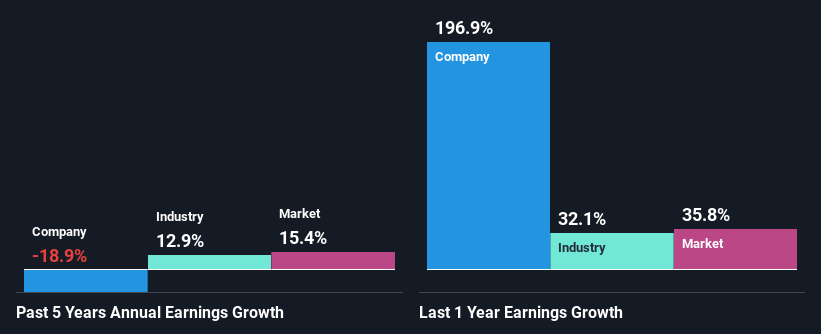First Capital Real Estate Investment Trust (TSE:FCR.UN) On An Uptrend: Could Fundamentals Be Driving The Stock?
First Capital Real Estate Investment Trust's (TSE:FCR.UN) stock is up by 3.8% over the past month. As most would know, long-term fundamentals have a strong correlation with market price movements, so we decided to look at the company's key financial indicators today to determine if they have any role to play in the recent price movement. Specifically, we decided to study First Capital Real Estate Investment Trust's ROE in this article.
Return on equity or ROE is a key measure used to assess how efficiently a company's management is utilizing the company's capital. Simply put, it is used to assess the profitability of a company in relation to its equity capital.
Check out our latest analysis for First Capital Real Estate Investment Trust
How Do You Calculate Return On Equity?
ROE can be calculated by using the formula:
Return on Equity = Net Profit (from continuing operations) ÷ Shareholders' Equity
So, based on the above formula, the ROE for First Capital Real Estate Investment Trust is:
10% = CA$484m ÷ CA$4.7b (Based on the trailing twelve months to September 2021).
The 'return' is the amount earned after tax over the last twelve months. So, this means that for every CA$1 of its shareholder's investments, the company generates a profit of CA$0.10.
What Is The Relationship Between ROE And Earnings Growth?
So far, we've learned that ROE is a measure of a company's profitability. Depending on how much of these profits the company reinvests or "retains", and how effectively it does so, we are then able to assess a company’s earnings growth potential. Assuming everything else remains unchanged, the higher the ROE and profit retention, the higher the growth rate of a company compared to companies that don't necessarily bear these characteristics.
First Capital Real Estate Investment Trust's Earnings Growth And 10% ROE
At first glance, First Capital Real Estate Investment Trust seems to have a decent ROE. Even when compared to the industry average of 10% the company's ROE looks quite decent. However, while First Capital Real Estate Investment Trust has a pretty respectable ROE, its five year net income decline rate was 19% . Based on this, we feel that there might be other reasons which haven't been discussed so far in this article that could be hampering the company's growth. Such as, the company pays out a huge portion of its earnings as dividends, or is faced with competitive pressures.
So, as a next step, we compared First Capital Real Estate Investment Trust's performance against the industry and were disappointed to discover that while the company has been shrinking its earnings, the industry has been growing its earnings at a rate of 13% in the same period.
The basis for attaching value to a company is, to a great extent, tied to its earnings growth. It’s important for an investor to know whether the market has priced in the company's expected earnings growth (or decline). By doing so, they will have an idea if the stock is headed into clear blue waters or if swampy waters await. Has the market priced in the future outlook for FCR.UN? You can find out in our latest intrinsic value infographic research report.
Is First Capital Real Estate Investment Trust Efficiently Re-investing Its Profits?
First Capital Real Estate Investment Trust seems to be paying out most of its income as dividends judging by its three-year median payout ratio of 70% (meaning, the company retains only 30% of profits). However, this is typical for REITs as they are often required by law to distribute most of their earnings. So this probably explains the company's shrinking earnings.
Moreover, First Capital Real Estate Investment Trust has been paying dividends for at least ten years or more suggesting that management must have perceived that the shareholders prefer dividends over earnings growth. Existing analyst estimates suggest that the company's future payout ratio is expected to drop to 51% over the next three years.
Conclusion
Overall, we feel that First Capital Real Estate Investment Trust certainly does have some positive factors to consider. However, while the company does have a high ROE, its earnings growth number is quite disappointing. This can be blamed on the fact that it reinvests only a small portion of its profits and pays out the rest as dividends. Up till now, we've only made a short study of the company's growth data. So it may be worth checking this free detailed graph of First Capital Real Estate Investment Trust's past earnings, as well as revenue and cash flows to get a deeper insight into the company's performance.
Have feedback on this article? Concerned about the content? Get in touch with us directly. Alternatively, email editorial-team (at) simplywallst.com.
This article by Simply Wall St is general in nature. We provide commentary based on historical data and analyst forecasts only using an unbiased methodology and our articles are not intended to be financial advice. It does not constitute a recommendation to buy or sell any stock, and does not take account of your objectives, or your financial situation. We aim to bring you long-term focused analysis driven by fundamental data. Note that our analysis may not factor in the latest price-sensitive company announcements or qualitative material. Simply Wall St has no position in any stocks mentioned.

 Yahoo Finance
Yahoo Finance 
